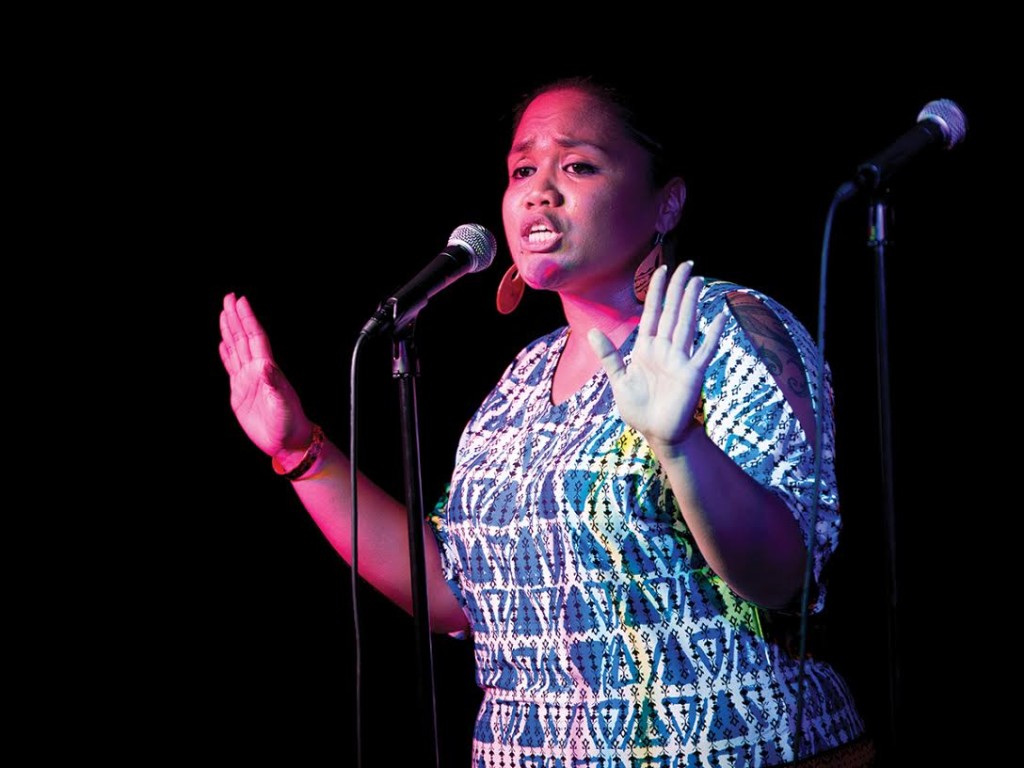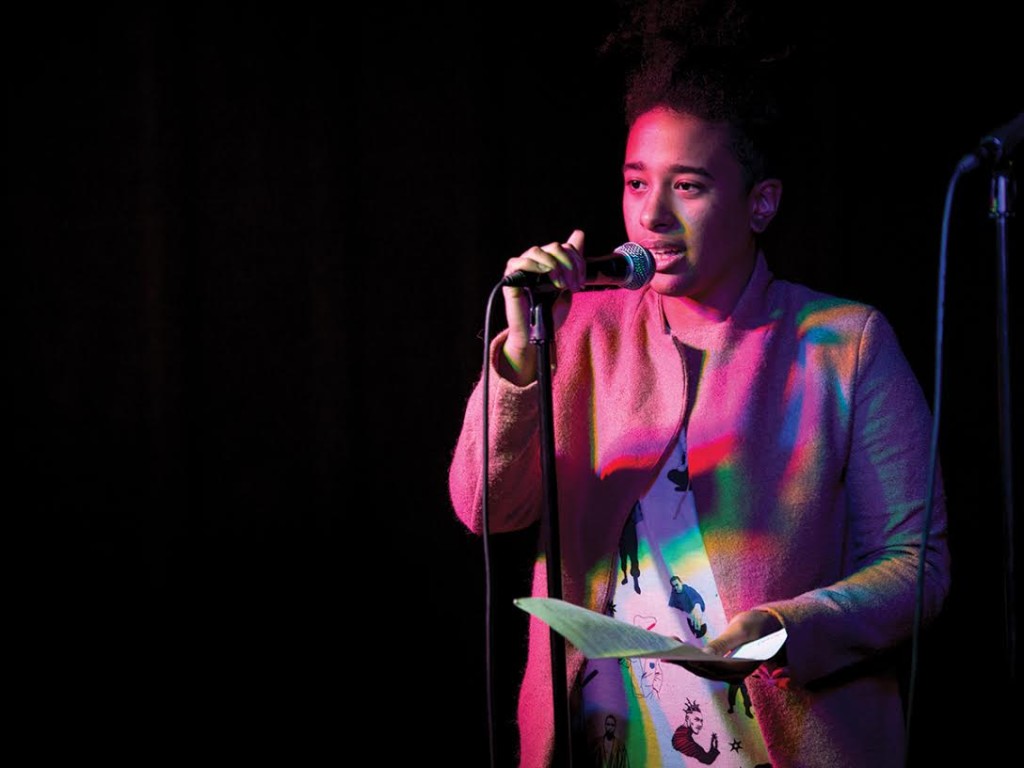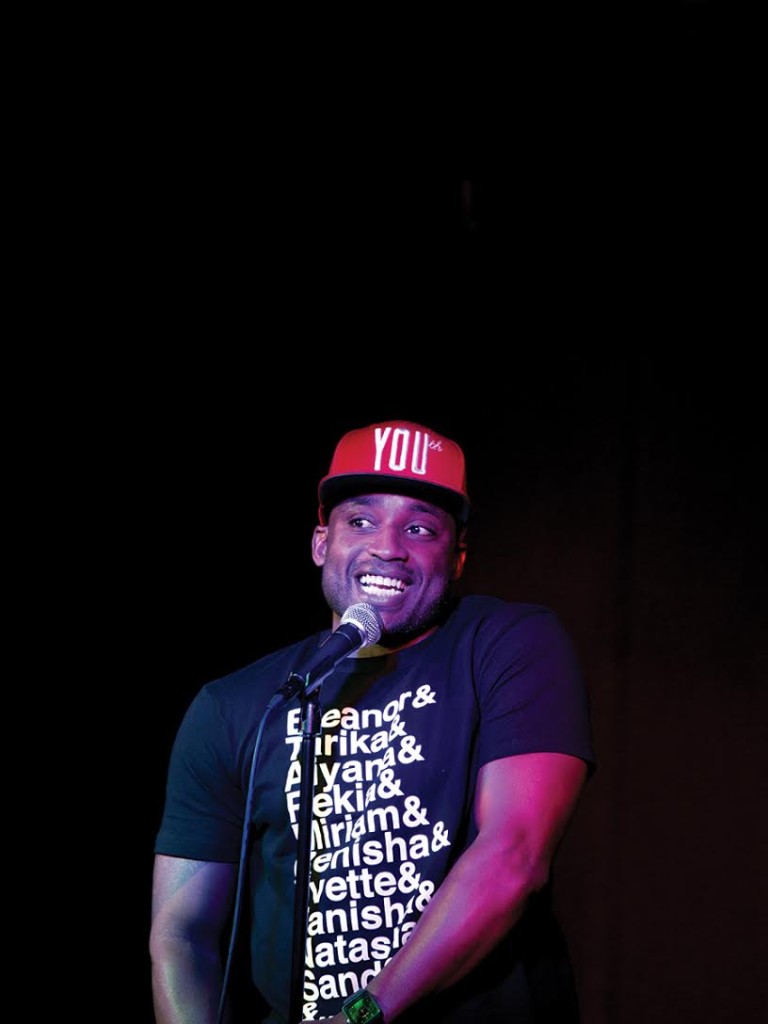The Barn at UCR held its first major event this year last Wednesday evening at 7 p.m. Students filled in by the dozens and took their seats for a night of poetry. In the back, there was a table for water and hot cocoa to keep the audience hydrated and warm. Organized by ASPB, the event was scheduled to present three famous contemporary poets and their work. Before that, however, students were encouraged to go up on stage and read their own poetry, which several did.
The first student performer, a third-year ethnic studies major who asked the audience “do you guys want to hear a poem about who I am, or about how much I love Nate Dogg?” which got the crowd cheering. Her poem was titled “All Doggs go to Heaven” where she praised Nate Dogg for “the only one who followed behind the steps of Snoop” and for “sparking a new generation of music: G-funk era, soulful gospel … and you chanted ‘hold up’.” Alexander Wilson Jr. read his poem “American Progress,” a blistering dissection of America’s contemporary disregard for black lives. “See, I believe, in American Progress,” Wilson Jr. spoke, “Where despite our varying skin tones and ethnicities we can all succeed / Where all people have the right to choose their own destiny.”
After the student performers came the three invited poets, who all brought heavy emotions to the Barn.

The first poet was Terisa Tinei Siagatonu. A spoken word artist hailing from San Francisco and a UCSC graduate, she asked how everybody was and inquired into which week UCR students were trudging through. After giving a deep sigh, she immediately went into her first poem without dropping its title. “I’m still alive because I’m not afraid of what I already know wants to kill me,” she began. “Because I’m first-generation, working class, queer, Samoan woman. Five chapters of a survivor’s story excavated from my bones. The reason: your oppression doesn’t know what to choose first.” She expressed a rage — sometimes controlled, but often explosive — at societal misunderstandings and disregards for her identity.
“This stage is both sanctuary and emergency room,” Siagatonu said. “My people are both doctors and patients, but there’s no patience left in them. Just stories with skin too dark for sympathy.”
After her first reading, Siagatonu spoke about living in California and brought up the struggles of “working my ass off as a student of color in the UC system.” She loves both her home in the Bay area and Southern California, but expressed fears over its current environmental conditions. “Lately, I’ve been struggling with the drought we’re experiencing here in California. We make fun of it a lot, but I’m really scared.” She then compared the differences between California with Samoa, noting “On the other hand, I come from an island that will probably sink within my lifetime.” It’s a difficult idea for her to reconcile with, which was why putting those thoughts into poetry helped her cope and understand her concerns, while also deconstructing cultural tropes about her identity and background, expressed in another untitled poem. “When people ask me where I’m from, I tell them home is a machete, and that I belong to places that don’t belong to themselves anymore. California: stolen. Samoa: sliced, stolen. But then, I feel like telling people the truth: that I actually come from water. But nobody believes you.”
She ended her set on a happy note by speaking of her love and her significant other, for poetry, for survival and for life. “Here, I am a wild heart in the key of life. I am certain that anything can kill me, but because of your smile I am unafraid of what will.”

Next up was Aziza Barnes. Born in Los Angeles and currently living in Mississippi, she apologized for her cold, which gave her voice a nasally tone. “I caught something on the plane,” she joked, “because planes are disgusting … I’m not gonna talk anymore. I’m just gonna scream.”
Barnes talked about visiting Brooklyn and comparing its cockroach problem with that of Mississippi’s: “if you have roaches in Brooklyn, you gotta clean up your place. But down in Mississippi, it’s like, this is their house. You fucked it up.” She brought up to humorous effect in her first poem while also connecting it to gentrification, with the cockroaches being a stand-in for gentrifiers. Like the poet before her, Barnes spoke of the complexities surrounding societal views of her identity, but related much of her poems to spirituality. “Let’s lay hands on her,’ said the Lord. ‘Let’s lay hands on her,’ said the black man. ‘Let’s lay hands on her,’ said the roaches that could fly.”

Javon Johnson was the last poet to speak on the mic. He set himself apart from the previous two performers due to his laid back and stand up-like routine. His ability to switch between completely serious and funny was a great sight to witness as he delved into similar issues that Siagatonu and Barnes explored.
With his first poem, “10 Reasons Why Women Are Like Religion,” he continued the night’s positive reflections of women and relationships and also demonstrated his interwoven style of sentimentality and comedy, with reasons like “both of them assume a portion of my income belongs to them” and “both want to tell me the most important shit during Sunday morning football.”
His hardest-hitting poems focused on institutional racism and how it affects him personally. When he learned about the protests following the failed attempt to indict Darren Wilson, he brought up his emotional breakdown in an unnamed and never-read poem. “I chose not to protest,” Johnson said. “Instead, I stayed home, shut down everything and like any good gospel conductor I demanded a better heart … I smiled and danced to Otis Redding and Nina Simone … I cut off all my lights because black was the only God worth praying to.” He ended the night on a happy note, saying “thank you for all being so beautiful.”
The Barn never felt more alive. The explosive and fiery poetry spoke truth into the world. It was a great success and hopefully there are many more nights like this to come.








